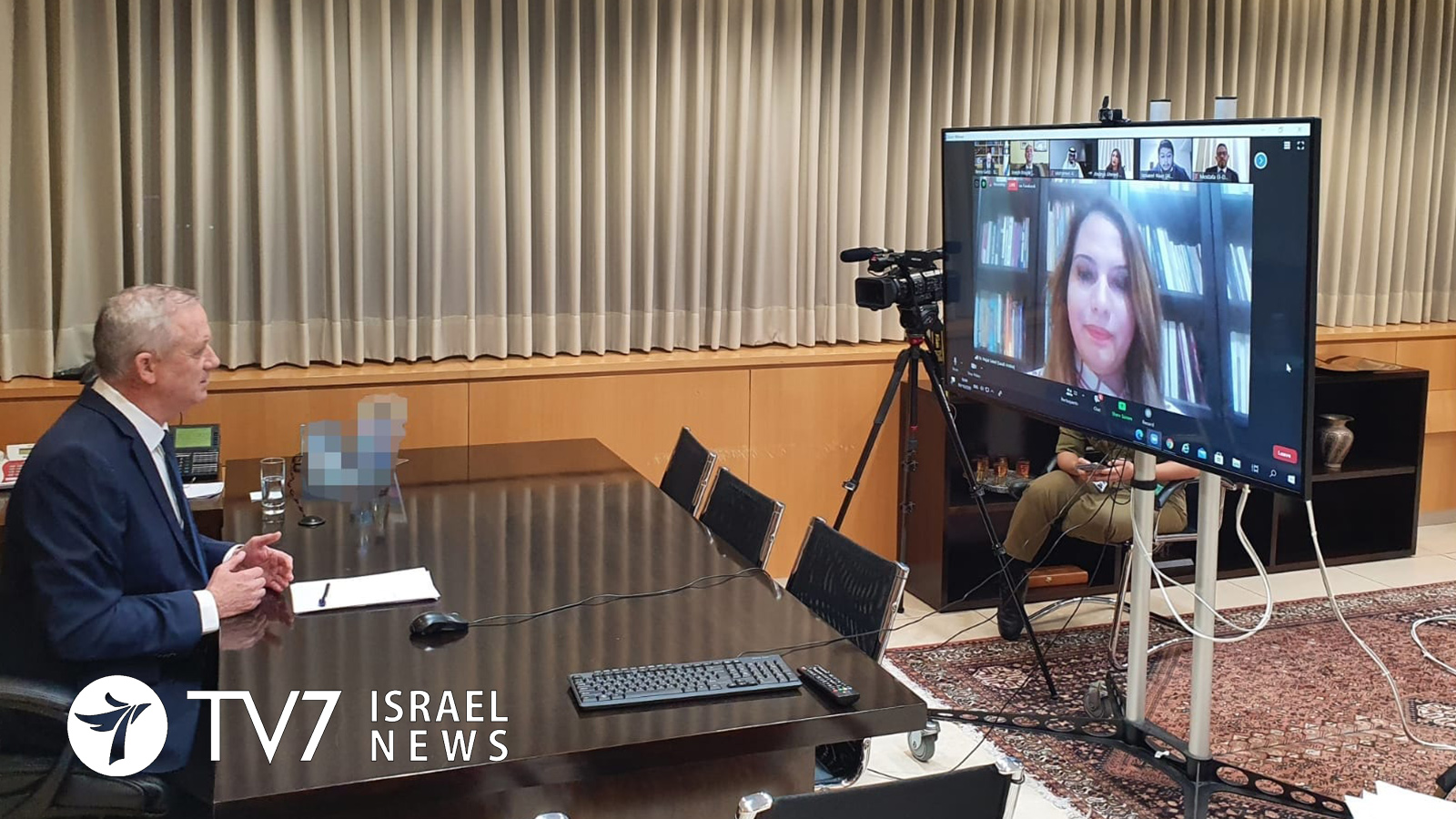Israeli Alternate Premier and Defense Minister Benny Gantz held a teleconference with media networks in Saudi Arabia, the United Arab Emirates and Bahrain.
According to an Israeli Defense Ministry statement to TV7, the event marks the “first-ever conversation between an Israeli defense minister and journalists from the Gulf states.”
The event was organized by the Arab Council for Regional Integration, which encourages outreach to Israel. The group identifies itself as “a pan-Arab initiative” that is “devoted to bringing security and prosperity to the Middle East, North Africa, and the Gulf by promoting a spirit of partnership that knows no borders” by overcoming a “destructive legacy” of “exclusion and rejection of the Other” – most “particularly Jews and Israelis.”
Journalists from the Emirati Al Roeya and Bahraini AlAyam newspapers participated in the conference call with the top Israeli defense official, along with colleagues from the Saudi Arabia-owned, Dubai-based Al Arabiya television news channel and others.
Gantz stated that “major mutual interests” Israel shares with Gulf Arab states are topped by “the struggle against extremism and Iranian destabilization,” and that “we need to form a united front to face it.”
“We have the strategic tools to face Iran. We are stronger than them,” he said, adding that, “our collaborations give us new strategies and options, and the Iranians understand that too — the best strategy for regional stability is peace,” the Israeli military leader told those joining the Zoom conference.
Underscoring the importance of confronting extremist ideologies, Gantz stressed, “we need to be able to offer a better alternative, to show the positive outcomes of moderation.”
“We have so much to offer each other,” Gantz emphasized, in appreciation for the people-to-people component of the Abraham Accords, adding, “Israel has largely been an island, but we have so much to offer and so much to receive. There is no better strategy than actual human ties.”
He went on to caution that “there is no shortcut. It’s going to be a long journey…. but if leadership on both sides, political, educational, cultural leadership can strengthen the positive, I believe that the good is going to win. I hope the children being born today will know that they were born into better times for this region.”
Israel’s arch enemy Iran and Turkey have both condemned the U.S.-brokered 15 September normalization deal between the Jewish and Arab Gulf powers as a betrayal of the Palestinian cause. Israeli Defense Minister Benny Gantz accused both countries of “denying promotion of peace and supporting regional aggression.”
Even though officials in Israeli generally avoid public censure of Turkey – with which it maintains trade and diplomatic relations despite Ankara’s pro-Palestinian stance – Gantz said the government of Turkish President Recep Tayip Erdoğan is a destabilizing influence. Turkey’s actions in northern Syria and the Eastern Mediterranean, as well as its Libya intervention and contacts with Palestinian Hamas terrorists “pushes away from stability.” After acknowledging that “definitely the question of Turkey is a very complicated one, because Turkey is part of NATO,” Gantz called for international pressure to bring about a change in Ankara’s conduct.
In remarks about problems posed by regional militias, Gantz zeroed in on Hezbollah in Lebanon. “I demand that states be held responsible. Lebanon cannot allow Hezbollah to operate against Israel from within Lebanon and later say – ‘Sorry, that isn’t us’ … Any country that faces these types of threats must be able to act against the direct threat posed by the militia, but also against the government hosting it. Governments must claim accountability from other states for what happens on their territory.”
He added: “Morality makes our life more complicated, but we must stay on the moral high ground.”
Turning to Israel’s conflict with the Palestinians, the Israeli Defense Minister said that he looks “forward to the day that everyone will understand that no one is going anywhere – and the best thing is to find the right solution.”
“Peace is the message, and it should be the message,” said Lt. Gen. (Res.) Gantz, who is a former IDF Chief of Staff. While calling for remembrance “that peace also requires work,” he then said, “it is by far better to struggle for peace than to struggle for war. The most difficult peace is better than the easiest war.”
